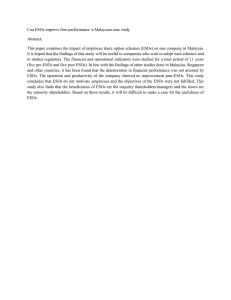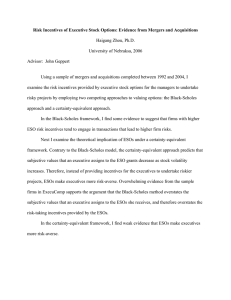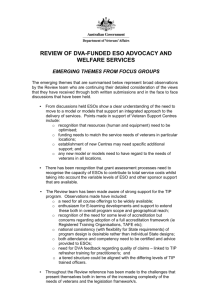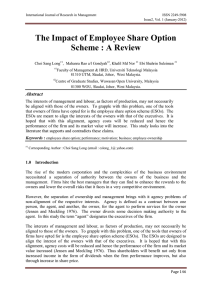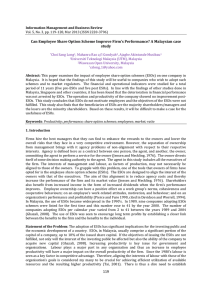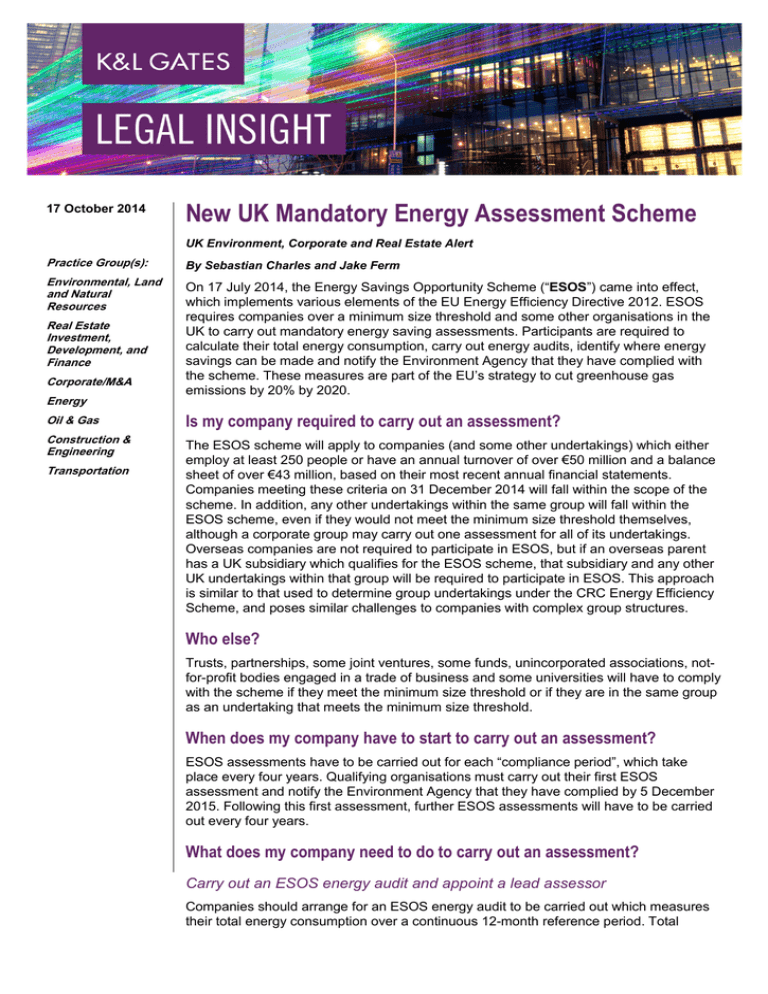
17 October 2014
New UK Mandatory Energy Assessment Scheme
UK Environment, Corporate and Real Estate Alert
Practice Group(s):
By Sebastian Charles and Jake Ferm
Environmental, Land
and Natural
Resources
On 17 July 2014, the Energy Savings Opportunity Scheme (“ESOS”) came into effect,
which implements various elements of the EU Energy Efficiency Directive 2012. ESOS
requires companies over a minimum size threshold and some other organisations in the
UK to carry out mandatory energy saving assessments. Participants are required to
calculate their total energy consumption, carry out energy audits, identify where energy
savings can be made and notify the Environment Agency that they have complied with
the scheme. These measures are part of the EU’s strategy to cut greenhouse gas
emissions by 20% by 2020.
Real Estate
Investment,
Development, and
Finance
Corporate/M&A
Energy
Oil & Gas
Construction &
Engineering
Transportation
Is my company required to carry out an assessment?
The ESOS scheme will apply to companies (and some other undertakings) which either
employ at least 250 people or have an annual turnover of over €50 million and a balance
sheet of over €43 million, based on their most recent annual financial statements.
Companies meeting these criteria on 31 December 2014 will fall within the scope of the
scheme. In addition, any other undertakings within the same group will fall within the
ESOS scheme, even if they would not meet the minimum size threshold themselves,
although a corporate group may carry out one assessment for all of its undertakings.
Overseas companies are not required to participate in ESOS, but if an overseas parent
has a UK subsidiary which qualifies for the ESOS scheme, that subsidiary and any other
UK undertakings within that group will be required to participate in ESOS. This approach
is similar to that used to determine group undertakings under the CRC Energy Efficiency
Scheme, and poses similar challenges to companies with complex group structures.
Who else?
Trusts, partnerships, some joint ventures, some funds, unincorporated associations, notfor-profit bodies engaged in a trade of business and some universities will have to comply
with the scheme if they meet the minimum size threshold or if they are in the same group
as an undertaking that meets the minimum size threshold.
When does my company have to start to carry out an assessment?
ESOS assessments have to be carried out for each “compliance period”, which take
place every four years. Qualifying organisations must carry out their first ESOS
assessment and notify the Environment Agency that they have complied by 5 December
2015. Following this first assessment, further ESOS assessments will have to be carried
out every four years.
What does my company need to do to carry out an assessment?
Carry out an ESOS energy audit and appoint a lead assessor
Companies should arrange for an ESOS energy audit to be carried out which measures
their total energy consumption over a continuous 12-month reference period. Total
New UK Mandatory Energy Assessment Scheme
energy consumption consists of energy supplied to the company, energy consumed by
the assets it holds and energy used in the course of its activities. This includes energy
consumption in buildings, transport and industrial processes. Landlords will have to
include energy supplied to the common parts of buildings and, in some cases, energy
supplied to their tenants.
Companies should try to use verifiable data. Where this data is not available, they should
make a reasonable estimate, notify the Environment Agency and record how the
estimates were calculated and why verifiable data was not used. Participants that have a
current certified ISO 50001 energy management system, and buildings with display
energy certificates or that have been assessed under the Green Deal, will be exempt
from the scheme.
ESOS energy audits must be carried out, overseen or reviewed by recognised lead
assessors registered with a professional body. In most cases, the audit must be signed
off by a director or by an equivalent senior manager within the company. Companies do
not have to file the audit itself, but they must notify the Environment Agency that they
have complied with the scheme.
Determine areas of significant energy consumption
Companies may identify areas of significant energy consumption, which must account for
at least 90% of total energy consumption. Once these areas have been identified, a
company is required to carry out an ESOS assessment on these areas. An undertaking
does not have to identify areas of significant energy consumption, but if it does not, its
entire energy consumption will be subject to ESOS compliance requirements.
Identify energy saving recommendations
The energy audit should analyse the company’s energy consumption and energy
efficiency and make recommendations for reasonably practicable and cost-effective ways
to improve them. There is currently no requirement to implement these
recommendations.
What are the sanctions for non-compliance?
The Environment Agency has powers to publish details of companies’ non-compliance,
serve enforcement notices on companies that are in breach of the scheme and issue civil
financial penalties. For example, the Environment Agency may issue a penalty of up to
£50,000 for failing to carry out an energy audit and may charge additional financial
penalties for continuing non-compliance.
There are a number of legal and practical issues that need to be considered when
complying with these regulations which may present particular challenges for foreign
parents with multiple UK subsidiaries and other groups with complex structures. Our
experience in advising clients on complying with similar requirements (e.g. the CRC
Energy Efficiency Scheme in the UK) makes us well placed to advise on the legal
requirements of this new scheme.
2
New UK Mandatory Energy Assessment Scheme
Authors:
Sebastian Charles
Sebastian.Charles@klgates.com
+44.(0)20.7360.8205
Jake Ferm
Jake.Ferm@klgates.com
+44.(0)20.7360. 8267
Anchorage Austin Beijing Berlin Boston Brisbane Brussels Charleston Charlotte Chicago Dallas Doha Dubai Fort Worth Frankfurt
Harrisburg Hong Kong Houston London Los Angeles Melbourne Miami Milan Moscow Newark New York Orange County Palo Alto
Paris Perth Pittsburgh Portland Raleigh Research Triangle Park San Francisco São Paulo Seattle Seoul Shanghai Singapore
Spokane Sydney Taipei Tokyo Warsaw Washington, D.C. Wilmington
K&L Gates comprises more than 2,000 lawyers globally who practice in fully integrated offices located on five
continents. The firm represents leading multinational corporations, growth and middle-market companies,
capital markets participants and entrepreneurs in every major industry group as well as public sector entities,
educational institutions, philanthropic organizations and individuals. For more information about K&L Gates or
its locations, practices and registrations, visit www.klgates.com.
This publication is for informational purposes and does not contain or convey legal advice. The information herein should not be used or relied upon
in regard to any particular facts or circumstances without first consulting a lawyer.
© 2014 K&L Gates LLP. All Rights Reserved.
3

